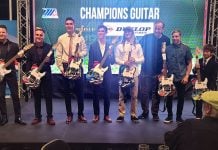PICKERINGTON, Ohio — The Consumer Product Safety Commission (CPSC) has decided to hold off on requiring third-party testing and certification of kid-sized all-terrain vehicles (ATVs) for lead content until Nov. 27, 2011, the All-Terrain Vehicle Association (ATVA) reports. The testing and certification is required under the Consumer Product Safety Improvement Act (CPSIA) of 2008, which is commonly called the “lead law.” The CPSC is responsible for implementing the law, including accrediting laboratories to do the testing. The CPSC earlier approved a stay of enforcement of the testing and certification requirement for kid-sized ATVs, which are designed for children age 12 and under, until Jan. 25. On Jan. 25, the commission extended the stay even further — until Nov. 27 — noting there are no accredited third-party testing facilities yet. The CPSC did say, however, that CPSC staff would conduct some testing. “In announcing its decision, the CPSC said that it received more than 400 comments asking for a stay of enforcement until Nov. 27,” said Ed Moreland, senior vice president for government relations of the American Motorcyclist Association (AMA), which is the sister organization of the ATVA. “The CPSC pointed out that AMA and ATVA members were among those who asked for the stay,” Moreland said. “The overwhelming majority of those who commented used AMA-provided tools to do so, and I want to thank everyone who answered our call to contact the CPSC. “Now is the time for all riders to contact their federal lawmakers and urge them to support H.R. 412, the Kids Just Want to Ride Act, to exempt kid’s machines from the CPSIA,” he said. “The easiest way to do that is through the ‘Rights’ section of the AMA website at AmericanMotorcycist.com.” The Kids Just Want to Ride Act, was introduced by U.S. Rep. Denny Rehberg (R-Mont.) on Jan. 25. The proposed law would exempt kid-sized off-road motorcycles and ATVs from the lead provisions of the CPSIA. The CPSIA effectively banned the sale of small displacement recreational vehicles due to overly restrictive lead content standards. Specifically, the CPSIA bans the making, importing, distributing or selling of any product intended for children 12 and under that contains more than a specified amount of lead in any accessible part. When the law was passed in 2008, that amount was 600 parts per million. The lead-content threshold then dropped to 300 parts per million after Aug. 14, 2010, and is set to drop to 100 parts per million, or the lowest level that is technologically feasible, after Aug. 14, 2011. Aimed at children’s toys, the CPSIA also ensnared kids’ dirtbikes and ATVs because trace levels of lead can be found in parts such as batteries and brake calipers. Other children’s products are also affected, such as books, clothes and microscopes. Many dealers are no longer selling kid-sized ATVs, and half of the major ATV manufacturers are no longer selling machines for kids because of uncertainty surrounding the CPSIA. About the All-Terrain Vehicle Association The All-Terrain Vehicle Association (ATVA) is dedicated to increasing members’ enjoyment of riding and owning ATVs by serving as a source of authoritative information about where and how to ride, products, events, and by protecting and promoting the rights of all ATV riders. The ATVA is part of the American Motorcyclist Association, the world’s most powerful voice for motorcyclists. For more information call toll free (866) 288-2564 or check us out online at ATVAonline.com. More, from a press release issued by American Motorcyclist Association: ‘Lead law’ reprieve for kids dirtbikes up for a vote PICKERINGTON, Ohio — The Consumer Product Safety Commission (CPSC) is poised to vote on a staff recommendation to delay enforcement of parts of the Consumer Product Safety Improvement Act (CPSIA) of 2008, or “lead law,” the American Motorcyclist Association (AMA) reports. Specifically, the staff suggests that CPSC commissioners delay enforcing the testing and certification requirements for kids’ dirtbikes and certain other products until Sept. 14. Currently there is a stay of enforcement that expires Feb. 10. At the same time, the staff recommends that commissioners delay enforcement of the lead-content limit part of the CPSIA for kids’ dirtbikes and all-terrain vehicles (ATVs) until Sept. 14. Commissioners approved a stay of enforcement of that part of the law earlier, but the stay expires May 1. Once it expires, the sale of kids’ dirtbikes and ATVs will effectively be banned because it’s unknown whether the requirements of the law can be met. The commission is expected to vote on the staff recommendation by Jan. 31. “We are urging the commissioners to approve the recommendation of its staff,” said Ed Moreland, AMA senior vice president for government relations. “Not only is the delay important for the reasons cited by the staff, but it also would give federal lawmakers more time to explore legislative solutions to the problems with the law.” On Jan. 25, U.S. Rep. Denny Rehberg (R-Mont.) introduced H.R. 412, the Kids Just Want to Ride Act, which would exempt kids’ off-highway vehicles (OHVs) from the CPSIA. “I would also like to thank the many members of the AMA and the AMA’s sister organization, the All-Terrain Vehicle Association (ATVA), who contacted the CPSC asking for delays in enforcement of the law,” Moreland said. “And I would urge those members and others to now contact their federal lawmakers to support H.R. 412. The easiest way to do that is through the ‘Rights’ section of the AMA website at AmericanMotorcyclist.com.” The CPSIA bans the making, importing, distributing or selling of any product intended for children 12 and under that contains more than a specified amount of lead in any accessible part. When the law was passed in 2008, that amount was 600 parts per million. The lead-content threshold then dropped to 300 parts per million after Aug. 14, 2010, and is set to drop to 100 parts per million, or the lowest level that is technologically feasible, after Aug. 14, 2011. Aimed at children’s toys, the CPSIA also ensnared kids’ dirtbikes and ATVs because trace levels of lead can be found in parts such as batteries and brake calipers. Other children’s products are also affected, such as books, clothes and microscopes. The law also requires all children’s products to undergo expensive periodic testing by independent laboratories approved by the CPSC and those products must be certified that they comply with the CPSIA. In its recommendation to commissioners, the CPSC staff notes that delaying enforcement of the testing and certification requirements as well as the lead-content limits would allow the commission to resolve a number of lingering issues related to the CPSIA. Those include determining whether it’s technologically feasible to lower the amount of lead in children’s products to 100 parts per million. That’s because if it isn’t technologically feasible, then the CPSC can decide on another limit, and manufacturers should know the limit before they do their testing and certification. In other action, the commissioners voted on Jan. 25 to extend its stay of enforcement on the testing and certification of kid-sized ATVs that was to expire on that day until Nov. 27. The CPSC noted “there are still no accredited third-party testing bodies for youth ATVs at this time” but CPSC staff would do compliance testing. For the latest information on this issue visit the AMA website at AmericanMotorcyclist.com. About the American Motorcyclist Association Since 1924, the AMA has protected the future of motorcycling and promoted the motorcycle lifestyle. AMA members come from all walks of life, and they navigate many different routes on their journey to the same destination: freedom on two wheels. As the world’s largest motorcycling rights organization, the AMA advocates for motorcyclists’ interests in the halls of local, state and federal government, the committees of international governing organizations, and the court of public opinion. Through member clubs, promoters and partners, the AMA sanctions more motorsports competition and motorcycle recreational events than any other organization in the world. AMA members receive money-saving discounts from dozens of well-known suppliers of motorcycle services, gear and apparel, bike rental, transport, hotel stays and more. Through its support of the Motorcycle Hall of Fame Museum, the AMA preserves the heritage of motorcycling for future generations. For more information, please visit AmericanMotorcyclist.com.
CPSC Postpones Testing Of Lead Content In Youth Recreational Vehicles
CPSC Postpones Testing Of Lead Content In Youth Recreational Vehicles
© 2011, Roadracing World Publishing, Inc.






